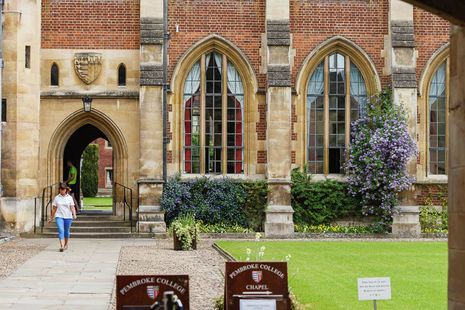Pembroke launches bursaries for study of its links to slavery
Pembroke follows St. Catharine’s College in funding three students to study the College’s historical links to slavery

Pembroke College has announced its decision to make three bursaries available, for current undergraduate or postgraduate students, to pursue research into the College’s links to slavery.
This is a U-turn after Pembroke initially announced, last summer, that it would cooperate with the University’s ‘Legacies of Enslavement’ Inquiry but would not undertake an independent college-specific enquiry.
Three bursaries, which will fund three students for four weeks each in July, will each be worth £1,500, in order for the College to better understand “the nature and extent of these connections”. They were advertised to students in an email sent around the College this week.
Pembroke Bursar, Andrew Cates, explained that after being “impressed by the positive experience of students in other colleges who have conducted such research”, Pembroke reversed their initial decision about an independent college enquiry.
Speaking to Varsity, Dr Paul Cavill, a Fellow in History at Pembroke explained that the College had been ‘inspired by’ the University-wide initiative which was announced last April.
The University’s ‘Legacies of Enslavement’ Inquiry, which will last two years from April 2019, has employed two research fellows. An interim report on the progress of the Inquiry will be presented to the Vice-Chancellor in Easter term.
Cavill, who is one of the Fellows responsible for establishing the Pembroke project, said that “it is likely that some members of Pembroke have had links to the institution of slavery”.
Whilst St. Catharine’s initiated a study after it was found to possess a bell which had been used on a slave plantation, the Pembroke project is not the result of any pre-existing findings of links to slavery.
The bell at St. Catharine’s will be transferred to an exhibition on slavery in the Dutch colonial period to be held at Rijksmuseum in Amsterdam between September 2020 and January 2021. The Rijksmuseum and St. Catharine’s will then decide together on a permanent location for the bell.
The St. Catharine’s slavery research project was conducted mostly in summer 2019, culminating in a research seminar which was held at the college in January.
Cavill explained that the Pembroke project will be “self-standing” but will also “be able to draw on the expertise of individuals outside the college”.
The advertisement to students emphasises that the Pembroke project is inspired by the St. Catharine’s project which is deemed to have been “particularly engaging and effective”. As such, the Pembroke project will be “modelled on” the project at St. Catharine’s in being “led by students” and involving “the general college community”.
Cavill explained that it is intended that the bursary holders “will assume the lead once the project gets underway”.
The successful applicants will also consult with those involved with the St. Catharine’s project.
The successful applicants will organise a seminar in Michaelmas term to share their findings with other Pembroke students. The advertising brief outlines the hope that the seminar will encourage the College community to “rediscover, acknowledge and learn from the past and how it has been represented”.
The bursary-holders are also expected to produce a publication which will be available on the College website.
The call for applicants emphasises that the project intends to “be a way of prompting the College to address the legacies of slavery, rather than a conclusive or determinative enquiry”.
Cavill said that the bursaries are merely “a first step in Pembroke’s response to the legacies of slavery”.
Not all colleges will independently investigate their historical links to slavery. Last summer, Varsity found that 16 colleges had committed to cooperating with the University-wide enquiry. At this point, only four colleges – King’s, St Catharine’s, Downing and Queens’ – planned to also initiate their own college-based enquiries.
 News / Report suggests Cambridge the hardest place to get a first in the country23 January 2026
News / Report suggests Cambridge the hardest place to get a first in the country23 January 2026 News / Students condemn ‘insidious’ Israel trip23 January 2026
News / Students condemn ‘insidious’ Israel trip23 January 2026 News / Cambridge ranks in the top ten for every subject area in 202623 January 2026
News / Cambridge ranks in the top ten for every subject area in 202623 January 2026 News / Uni denounced for bypassing ‘democratic structures’23 January 2026
News / Uni denounced for bypassing ‘democratic structures’23 January 2026 Comment / Cambridge has already become complacent on class23 January 2026
Comment / Cambridge has already become complacent on class23 January 2026









